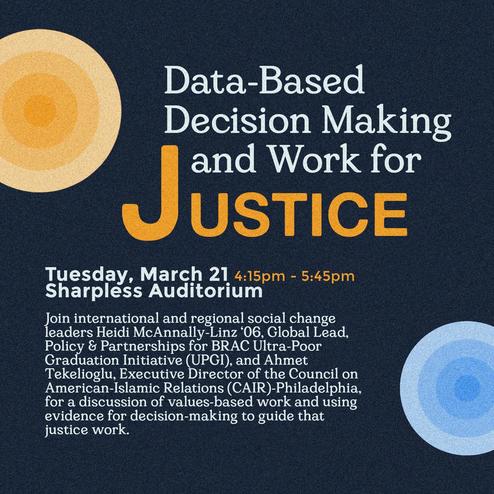
Data-based Decision Making and Work for Justice
Contact
Carpenter, Allison
Type
Audience
- Faculty and Staff
- General Public
- Students
Event Calendar
Join international and regional social change leaders Heidi McAnnally-Linz ‘06 and Ahmet Tekelioglu for a discussion of values-based work and using evidence for decision-making to guide that justice work.
Data-based Decision-Making, Social Change, and Making a Difference with Heidi McAnnaly Linz, BRAC Ultra-Poor Graduation Initiative (UPGI) and Ahmet Tekelioglu, Council on American Islamic Relations
Join international and regional social change leaders Heidi McAnnally-Linz ‘06, Global Lead, Policy & Partnerships for BRAC Ultra-Poor Graduation Initiative (UPGI), and Ahmet Tekelioglu, Executive Director of the Council on American-Islamic Relations (CAIR)-Philadelphia, for a discussion of values-based work and using evidence for decision-making to guide that justice work.
McAnnally-Linz served for several years as Director of Policy and External Relations at Innovations for Poverty Action (IPA), a global initiative mobilizing evidence-based decisionmaking to support human flourishing by addressing acute poverty. More recently, she served as Associate Director of Yale University’s MacMillan Center for International and Area Studies before her current role with BRAC, a global catalyst for people living in poverty to reach their full potential. After graduating from Haverford, McAnnally-Linz was selected as a Thomas J. Watson Fellow and worked with indigenous groups throughout Latin America, including leading several small nonprofits before moving on to IPA.
Tekelioglu is a Turkish-American academic and organizer. His research focuses on American Muslim history and identity. He received his PhD in political science from Boston University in 2016. Concurrently, he directs the digital Islamic Studies project themaydan.com at George Mason University where he is a research fellow at the Center for Global Islamic Studies. Tekelioglu also directs CAIR-Philadelphia’s Civic Engagement and school district projects and serves on the Inclusion and Equity Committee at the Pennsylvania Department of Education. He and CAIR have played key roles in multi-organizational initiatives using evidence-based strategies to get out the vote among the populations they serve.
Learn more about each of these initiatives, along with key insights from acting philanthropic leaders regarding the role of evidence-based methods in social change work.



